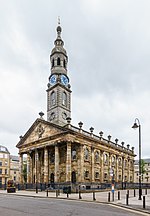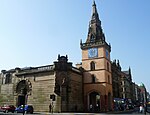St Andrew's in the Square
Category A listed buildings in GlasgowChurches completed in 1756Clock towers in the United KingdomFormer churches in ScotlandListed churches in Glasgow ... and 1 more
Use British English from January 2018

St Andrew's in the Square is an 18th-century category-A-listed former church in Glasgow, Scotland, considered one of the finest classical churches in Scotland, and now Glasgow's Centre for Scottish Culture, promoting Scottish music, song and dance. The church is in St Andrew's Square, near Glasgow Cross and Glasgow Green, on the edge of the City's East End.
Excerpt from the Wikipedia article St Andrew's in the Square (License: CC BY-SA 3.0, Authors, Images).St Andrew's in the Square
St Andrew's Square, Glasgow Merchant City
Geographical coordinates (GPS) Address Website External links Nearby Places Show on map
Geographical coordinates (GPS)
| Latitude | Longitude |
|---|---|
| N 55.854866666667 ° | E -4.2430027777778 ° |
Address
St Andrew's in the Square
St Andrew's Square
G1 5PQ Glasgow, Merchant City
Scotland, United Kingdom
Open on Google Maps







